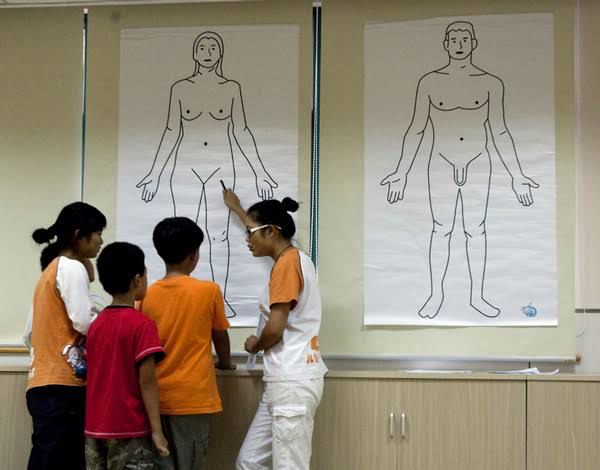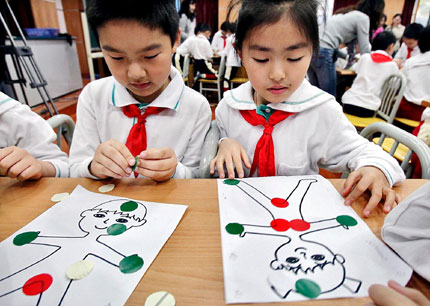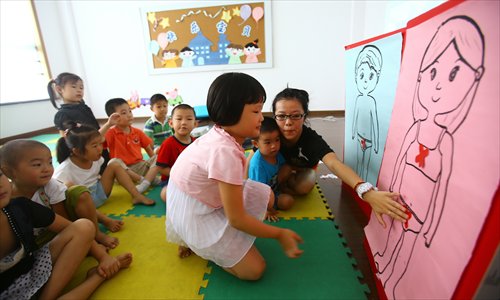
A vital part of a child’s entire development is teaching them about sex education, which has an impact on how they view relationships, respect, and their own bodies. Parents can equip their children with the knowledge and abilities needed to confidently and maturely negotiate the complexity of human sexuality by thinking and thoroughly handling this topic.
Begin Early and Age Appropriately
In the early years (ages 3-5), it’s critical to present fundamental ideas in a straightforward and developmentally appropriate way. Start by teaching kids the names of their body parts correctly, putting a strong emphasis on privacy, and assisting them in realizing that some body parts belong to them and should not be touched by others. This establishes the groundwork for them to respect their own bodies and recognize boundaries.
Middle Childhood (Ages 6–8): Explain the fundamentals of human reproduction to youngsters as they get older. Give a brief explanation of the development of babies, emphasizing age-appropriate biological facts. Answer any inquiries they may have regarding the origins of babies and dispel any myths they may have learned from friends or the media.

Pre-Adolescence (Ages 9–12): Talk about more specific parts of reproduction and physical changes with children as they get closer to puberty. This includes elucidating the bodily changes brought on by puberty, such as girls’ menstruation and guys’ voice changes. During this time, help them emotionally prepare for the changes that will come and tell them that these changes are normal and a necessary part of growing up.
Teen Years (Up to Age 13): Examine issues like sexual consent, STIs, contraception, and the emotional components of relationships in greater detail during adolescence. Talk about how important it is to respect boundaries and make responsible sexual decisions. Give accurate information regarding contraceptive techniques and stress the value of safeguarding one’s sexual health.
Establish a Clear and Safe Space for sex education to be effective, a safe and open environment must be established
Encourage Inquiry: Ensure your kids understand they can ask any questions without worrying about being judged. Encourage an environment of openness and trust so kids can talk freely about delicate subjects. Encourage them to talk to you about their issues instead than depending on information from sources that might not be trustworthy.
Take Advantage of Teachable Moments: Conversations on sex education can arise organically from ordinary circumstances. For instance, conversations on relationships or current sexuality-related events may come up in the media. Take advantage of these opportunities to start discussions and offer advice based on actual experiences.
Make Use of the Right Resources
Books and Educational Resources: Make use of age-appropriate literature, instructional films, and internet sites that offer truthful data regarding relationships and sex. Numerous materials are available that are specifically made to teach these ideas in a way that is appropriate for various age groups, supporting the lessons that kids receive at home and in school.
School Programs
Take an active role in debates over your child’s sex education curriculum and keep yourself updated about it. To guarantee that they have thorough comprehension, supplement what they learn in school with more knowledge and conversations at home.

Attend to Social and Emotional Issues
Relationships and Respect: Stress the value of strong partnerships that are based on mutual understanding, respect, and trust. Teach kids to respect their own limits and understand the significance of consent in all relationships by talking about the concept of consent in both physical and emotional circumstances.
Peer pressure and emotions: Assist kids in navigating the emotional sides of relationships, such as social influences and peer pressure. Teach them to distinguish between appropriate and inappropriate conduct in love and friendship situations. Urge children to follow their gut feelings and to ask for help from responsible adults if they feel uncomfortable or under pressure.
Make Use of Actual Situations
Playing a role
Children can practice being assertive and making decisions by participating in role-playing activities. Play out scenarios where kids have to stand up for themselves or give in to peer pressure, for instance. Children who receive this hands-on training may feel more capable of managing circumstances in the real world.
Situations and Consequences: Talk about fictitious relationships and sexual encounter situations. Discuss the possible outcomes of various actions and choices with kids to help them realize how important it is to make responsible decisions that are consistent with their beliefs and objectives.
Have Clarity and Honesty
Basic Justifications
In response to inquiries from kids concerning sex and reproduction, give them direct, simple explanations. Don’t confuse kids with euphemisms or explanations that are too complicated; instead, use language that is appropriate for their age. Make sure they know that they may ask you any questions, no matter how delicate the subject.
Honesty: Be forthright about your knowledge and ignorance. Acknowledge your uncertainty and offer to work with the other person to locate trustworthy information. Being truthful fosters open communication and trust between you and your child.
Review the Conversation
Often Continuous Conversation
As kids get older and more mature, there should be a constant conversation on sex education. Regularly revisit and elaborate on subjects, adjusting your talks to their evolving comprehension and encounters. Use significant events like the onset of puberty or starting high school as a chance to expand their understanding and handle fresh queries or worries.
Extra Advice
Be Positive
Have a positive outlook and emphasize the value of knowing one’s body and making educated decisions while having discussions on sex education. Emphasize the advantages of knowing the truth about relationships and sexuality.
Employ Correct Terminology
To normalize conversations about bodies and lessen embarrassment or discomfort, start using correct anatomical language at a young age. Teaching kids to utilize these words encourages them to have a positive body image and emphasizes the value of clear communication.

Nonverbal Communication
When having a conversation with your child regarding sex education, pay attention to their nonverbal clues. To keep the environment open and encouraging, make sure they feel understood and at ease, and modify your strategy as necessary.
In conclusion , educating kids about sex education is an ongoing process that calls for tolerance, understanding, and a dedication to giving them correct knowledge. Parents can give their children the knowledge and skills they need to navigate relationships, respect others and themselves, and make wise decisions throughout their lives by starting early, establishing a safe and open environment, using appropriate resources, addressing emotional aspects, using real-life scenarios, being honest and clear, revisiting discussions on a regular basis, and incorporating additional tips. In addition to giving children more authority, this proactive approach improves the relationship between parents and children and promotes positive views about relationships and sexuality.